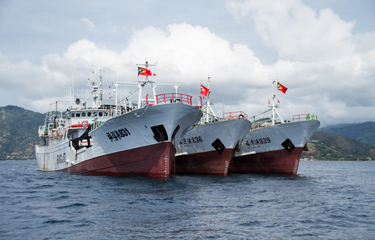China’s new subsidy reforms don't include distant-water fleet

A major new reform of China’s fishery subsidy system doesn’t apply to its distant-water fleet.
Leaders in the provinces of Fujian and Shandong – two key bases for the country’s distant-water fleet – recently announced they will scrap fuel subsidies in favor of payments linked to compliance with fishery laws and conservation goals.
Subsidies granted by the provinces to fishing firms will now be awarded based on fishing trawlers meeting a series of requirements that include port entry and exit reports and the use of location-monitoring equipment and reporting of fishing data. Fujian province has also included catch limits on juvenile fish as part of its requirements.
Many of the requirements are similar to those being recommended by international organizations as a means to curtail illegal, unreported, and unregulated (IUU) fishing. The changes were made as World Trade Organization (WTO) officials met for a preliminary round of negotiations on a deal to limit fishery subsidies, prior to the WTO’s 12th Ministerial Conference, commencing 12 June.
Even as China says it wants to be part of a WTO deal limiting harmful fishery subsidies, it has also continued to back the expansion of its distant-water fleet. In March 2022, China increased the subsidies it paid to the country’s biggest state-owned tuna fishing firms Kaichuang Marine International and CNFC Overseas Fishing. And China’s government has teamed up with its seafood sector to promote increased consumption of the distant-water catch. This spring, the Chinese Agriculture Ministry’s Fisheries Administration Bureau and executives from China’s Distant-Water Fishing Association jointly hosted events in the interior regions of the country presenting an increased distant-water haul as a way of taming price inflation and conserving local fisheries.
Even though Chinese distant-water fishing firms have been implicated in numerous IUU incidents in recent years, these infractions have not been widely reported in China, where the country’s government continues to present distant-water fishing as a methods for conserving its domestic waters.
In 2021, China initiated a 10-year ban on fishing in the Yangtze River and its tributaries intended to counter chronic depletion of fish stocks in China’s biggest river. Speaking by video link to a gathering of fishery firms and catering executives in Chongqing, Fisheries Administration Bureau Inspector Li Shumin described how increasing consumption of tuna, squid, and krill caught outside of Chinese waters was “of strategic importance” to China’s geopolitical ambitions as well as to the country’s dietary health.
Photo courtesy of Matthew Thomas Barbour/Shutterstock






Share